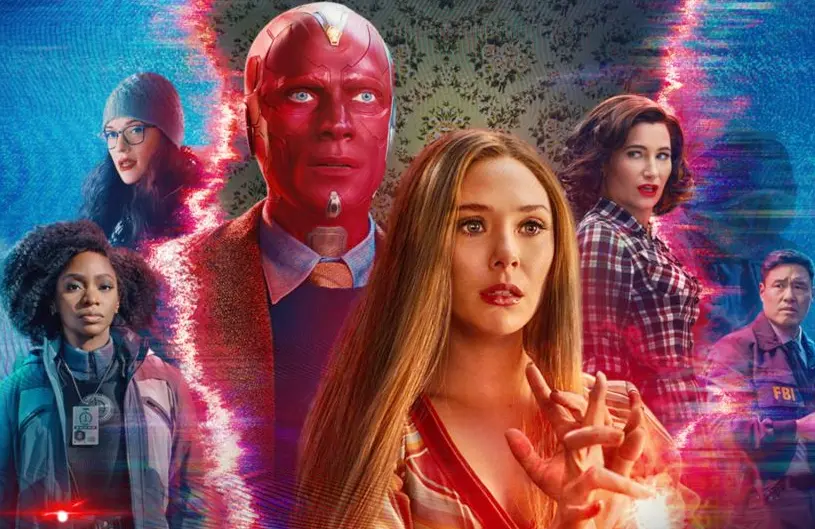How WandaVision Won Us Over Despite MCU Fatigue
-
 Teyonah Parris, Kat Dennings, Paul Bettany, Elizabeth Olsen, Kathryn Hahn and Randall Park in WandaVision. (Disney+)
Teyonah Parris, Kat Dennings, Paul Bettany, Elizabeth Olsen, Kathryn Hahn and Randall Park in WandaVision. (Disney+)If you think about it for even half a second, it should come as no surprise that one of the most popular TV shows of the moment is Disney+'s WandaVision. Coming off of a decade-plus of dominance at the box office, the fact that Marvel is also enchanting the stay-at-home public with a spinoff series isn't exactly news. And yet there's something about it that feels unlikely. Part of it is the format, a fully-committed pastiche of classic American sitcoms that, for the first two episodes, was delivered almost entirely with a straight-face. For a viewing audience that doesn't always love change, that's a risk. But moreover, there's the fact that after Avengers: Endgame paid off the Marvel decade with a bigger-than-big send-off for its biggest characters, the idea of picking up that Marvel gauntlet again was a daunting concept. Would fatigue set in after Endgame and lead to diminishing returns on the many Marvel projects still to come?
While you'll probably find some WandaVision detractors out there, the fact is that the show has become a huge success for Disney+ and the MCU, obliterating any fears that Marvel fatigue might plague its Disney+ shows, and in fact getting people excited about a Marvel property in a whole new way. Not since Game of Thrones has a TV show been so pored over and hotly anticipated on a weekly basis, with plenty for hardcore Marvel fans to chew on, and endless pleasures for less intense viewers to enjoy. WandaVision is so dazzling because it works on multiple levels. If you're invested in the greater MCU, the story of Wanda Maximoff ensconced in her own Nick at Nite fantasy world in order to shield herself from the grief of losing the love of her life has incredible resonance. The Wanda/Vision love story that developed over the course of several MCU films provides a hefty emotional backstory for what we're seeing unfold this season. And if you don't really know or care about deeper Marvel lore, you can enjoy the incredible precision with which WandaVision presents its ever-accelerating sitcom world, from the visuals, to Elizabeth Olsen and Paul Bettany's perfectly attuned performances, to the show's cheeky credits sequences.
We'll never know what might have happened in a world without COVID-19, but the fact that WandaVision was the first new Marvel project since Spider-Man: Far From Home was released in July of 2019,= probably went a long way towards getting us over the hump. If anyone was burned out on Marvel after Avengers: Endgame, they had a whole lot of absence to make their hearts grow fonder. With both the Black Widow and Eternals movies pushed to late 2021, suddenly the TV-ness of WandaVision wasn't a limiting factor but a boon to its ability to reach the wide audience that the theatrical features couldn't. And since Black Widow is supposed to be a prequel of sorts, WandaVision was able to pick up the MCU baton where Endgame left off.
When Disney+ announced their slate of Marvel series in the wake of Endgame, you'd have been forgiven for thinking they all seemed a bit… supplemental. Falcon and the Winter Soldier fighting crime now that Captain America has hung up his shield. Loki solving mysteries somewhere out in the multiverse? Wanda and Vision starring in a quasi-Dick Van Dyke Show? After Marvel's previous attempts at TV — ABC's Agents of SHIELD and Netflix's Defenders series — failed to meaningfully intersect with the larger MCU, it seemed possible that these shows were merely going to be Disney+ subscriber-bait, trading on side characters and fan-service. But from all indications, WandaVision may just be the thing that sets the next phase of Marvel into motion. The fact that Olsen is set to co-star in the next Doctor Strange movie (due in March 2022) suggests as much, as does the fact that WandaVision introduced Monica Rambeau (played by Teyonah Parris), who is a major character in Marvel lore. Throw in Kathryn Hahn's Agatha Harkness, whose reveal has been popular enough to put her on par with the likes of Loki among Marvel villains, and you've got the potential to branch out all over this next series of films.
More than anything, though, WandaVision has been an odd but welcome return to entertainment normalcy these last few weeks. A TV show we're all obsessing over that manages to take the bigness of the Marvel universe and refract it through the lens of television. A tent-pole event movie wouldn't have been able to explore Wanda's grief in any way, much less via a quirky and creative alternate reality like we're seeing. We wouldn't have gotten Monica's unique POV on what happened when everybody Thanos snapped away got snapped back five years later. The Marvel movies, like all major studio action movies, do spectacle very well. TV does grief very well. WandaVision has managed to do both.
People are talking about WandaVision in our forums. Join the conversation.
Joe Reid is the senior writer at Primetimer and co-host of the This Had Oscar Buzz podcast. His work has appeared in Decider, NPR, HuffPost, The Atlantic, Slate, Polygon, Vanity Fair, Vulture, The A.V. Club and more.
TOPICS: WandaVision, Disney+, Elizabeth Olsen, Kathryn Hahn, Paul Bettany, Teyonah Parris, Marvel Cinematic Universe